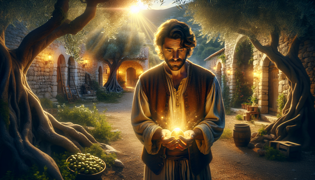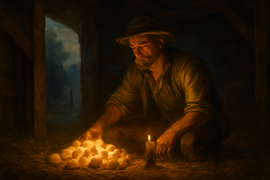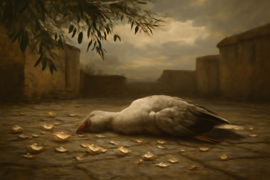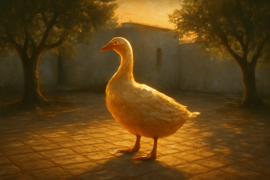Introduction
In a sun-baked valley of ancient Greece, nestled among olive-kissed hills and winding cobblestone paths, lay a modest village of whitewashed cottages and low stone walls smeared with the rosy glow of dawn. Each morning, farmers and shepherds rose with first light to tend their fig orchards, goats, and vineyards, rolling wooden carts across dusty lanes that echoed with the braying of mules and the distant song of temple bells. Among them lived Thalos, a young farmer whose heart was as generous as his harvest was meager. Though he worked from sunrise to dusk, the stubborn fields yielded barely enough grain to fill his family’s clay jars. One crisp morning, as a gentle breeze stirred the fronds of a nearby olive tree, Thalos stepped into his courtyard and froze. There, amidst scattered straw and the sunlit dust of his coop, lay a single egg unlike any he had seen—its shell gleaming with burnished gold, each curve catching the light like a promise from Olympus. Breathless with astonishment, he carried it to his wife, Calla, who gasped as her eyes widened at the weight and color of this divine relic. Word raced through the village like wildfire, drawing curious neighbors who knelt in wonder, murmuring prayers of thanks to Athena. Each dawn thereafter, the mysterious goose that wandered into Thalos’s care laid one luminous egg, as heavy and radiant as treasure itself. They handled these gifts with reverence, placing each orb in a linen cloth and hiding them beneath ivy-clad walls. As their humble hearth began to prosper, baskets teemed with olives, honey dripped from wooden spindles, and laughter echoed through the courtyard. Yet with every glinting egg, a new ember of desire sparked in Thalos’s heart—an ember that shone with the warmth of hope but threatened to ignite the tinder of regret.
A Miracle in the Courtyard
Thalos could hardly believe his eyes when, on the second morning, the golden goose appeared again. He rose before dawn, the soft hush of the world broken only by the low bleat of his goats and the whisper of breeze through olive branches. In the amber glow of lantern light, he entered the coop with bated breath. There, nestled in straw as if it had grown from the earth itself, lay a second egg, the color of melted dawn. Heart pounding, he lifted the egg gently and examined it: cool to the touch, flawless in form, its surface reflecting an otherworldly glow. He carried it to Calla, whose tears of joy slipped quietly down her cheeks as she cradled the treasure like an offering from the gods. They worked in hushed reverence for days, bundling each egg in soft linen and hiding them beneath false flints in the old well. Word of their fortune spread beyond the village, drawing travelers from distant hillside towns who arrived by mule train in search of whispers and hope. They came bearing cloaks of wool and amphorae of olive oil, offering riches for a single glimpse of the golden egg. Thalos greeted them all with modest pride, but each time he removed the hidden egg, he felt the heat of envy flicker across his chest. He found himself counting how many neighbors had left empty-handed, lamenting their own misfortune in comparison to the miracle before his eyes. Each compliment felt like a blade of flattery, a promise that the gods were obliged to him, as though his daily toil alone had earned divine favor. Yet Calla cautioned him gently, reminding him that the goose was a living gift deserving of kindness, not just a vessel of endless wealth. Still, the gravity of the promise lay heavy on Thalos’s mind, as certain and seductive as the golden horizon beyond the mountains.

Seeds of Greed
By the sixth dawn, Thalos awoke with a restlessness that no prayer or ritual could dispel. The coop door creaked as he slipped inside, torch in hand. He had begun to measure his days not by the rising sun but by the weight of expectation that pressed upon him each night. The goose looked up at him with calm, deep eyes, its feathers ruffling in the cool morning air. Thalos set his torch down and knelt, letting its flickering glow dance across the golden sheen of the afternoon’s gift. Calla stood in the doorway, her face pale. "Husband," she whispered, "there is enough. Let us give thanks and be content." But Thalos’s gaze hardened. He stepped forward and laid one hand upon the bird’s back, then another. "Enough?" he murmured. "These eggs are worth more than all our fields. If I could see the treasure piled high, I could lift my family beyond want forever." He felt the bird tremble at his touch, the soft rustle of wings as it shifted beneath his grip. In that moment, Thalos admitted the truth to himself: he hoped for more than he dared confess. He dreamed of chests overflowing with gold, of merchants bowing to his wealth, of his children living without the fear of hunger. That night, their small house lay silent except for Thalos’s restless pacing. He sharpened a rusty blade by candlelight, glancing at the hidden eggs in a woven chest. Thoughts of ruin—of fields left fallow, of doors left unbolted—haunted his mind. Yet the dream of unending bounty dazzled him. He rose before first light and crept to the coop, the blade cold in his hand. When Calla followed, alarm soft on her lips, she found the coop door standing open and the torch fallen to the straw, but Thalos was nowhere to be seen. In the hush of dawn, only a broken shell and a faint echo of regret marked what had passed.

A Fatal Mistake
When Calla found Thalos at the edge of the courtyard, his hands shook as he held the fractured shell. The golden interior lay in jagged pieces, dull now in the pale dawn. She pressed a trembling hand to his shoulder, her voice barely a breath: "What have you done?" Thalos’s eyes brimmed with tears, regret and disbelief warring in his gaze. "I thought… I believed…" he stammered, but words failed him. Behind them, villagers gathered at the coop, drawn by the strangled cry of the golden goose. They came rushing over whitewashed walls, olive branches brushing their skirts. In the hush that followed, they saw the bird—a creature of feathers and breath—lying motionless upon the earth, its light extinguished. Mothers covered their children’s eyes. Neighbors wept. The mosaic courtyard, once gleaming with promise, felt cold and hollow. Thalos fell to his knees, pressing his face against the dusty ground as the first tears of true sorrow stained his cheeks. Calla wrapped her arms around him, her own body shaking. "It was a gift," she whispered. "It was never ours to possess beyond care. We had only to be grateful." The villagers, sensing the weight of grief and lesson, stepped back quietly, leaving the broken eggs and the fallen farmer together in the stillness. In that moment, Thalos understood the cruel truth: in grasping for limitless treasure, he had destroyed the one miracle entrusted to his mercy. No gold remained to bind wounds or buy solace. Only memory and regret endured, heavier than any egg of purest dawn.

Conclusion
In the quiet that followed the tragedy, Thalos and Calla buried the remains of their golden goose beneath an olive tree, weaving small garlands of wildflowers at its base. Villagers came in reverent silence to pay their respects, each laying a pebble or handful of earth upon the simple mound. Over time, the story of Thalos’s loss traveled beyond the valley—through Athens’s marble columns, across island harbors, and even to the far reaches of temple steps in distant lands. It grew into a cautionary tale, whispered by traders and scholars alike: that true wealth lies not in the glitter of gold but in the gentle bonds of trust and gratitude. Generations later, children would gather on sunlit hills to listen as elders spoke of the farmer who lost paradise in a single moment of folly. And when they arose each morning to blue skies and singing birds, they would remember that the greatest treasures are those we nurture with kindness rather than seize with greed.



















